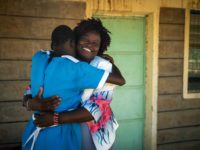Veerachai Nimmitthamrongkul, more commonly called Bee, was sponsored by Compassion when he was growing up. But now Bee has been working as a Partnership Facilitator (PF) for Compassion Thailand for six years.
 Bee still recalls the letters he received from his sponsor from Canada. The letters always encouraged him to keep on studying and stressed the significance of education.
Bee still recalls the letters he received from his sponsor from Canada. The letters always encouraged him to keep on studying and stressed the significance of education.
The support and letters of encouragement from his sponsor enabled Bee to break free from the chains of poverty.
Now Bee has been blessed with the opportunity to serve the Lord in ministry.
Bee’s life was radically transformed because of his sponsorship, and he now gladly serves as a bridge between sponsors and children.
He hopes that each sponsor can make a difference in a child’s life in the same way that his sponsor dramatically transformed his.
A typical day for Bee starts at 6:30. He wakes up and spends about an hour getting ready for the day.
At 7:30 he leaves the quiet and tranquility of his room and heads to his busy and activity-filled job at Compassion.
Every morning Bee starts work with a time of devotions with fellow staff from 8 to 8:40.
Then he begins work. Bee juggles many tasks as a PF.
“The main responsibility for a partnership facilitator can be broken down into four parts.
“The first part is to complete routine work such as monitoring the project budget and program, planning for travel, strategy planning, organizing and arranging team and office meetings, as well as following up on letters and memos.
“The second is to equip church partners to have the potential and capacity to work with children effectively.
“The third is to equip myself. I have to learn and study new things in order to support and help the projects.
“The fourth part is to participate in office activities.”
“PFs typically work with 12 church partners on various projects, but I have 13 development centers to work on.
“Every month I travel to different sites for two to three weeks at a time. I spend about two days supporting and facilitating a child development center.”
As a PF, Bee must make a conscientious effort to always be humble and patient because he works directly with staff members from different backgrounds, listening to their problems and assisting the staff members in finding solutions to them.
The many different languages spoken in Thailand often creates communication barriers. More than half of Compassion Thailand’s church partners are run by various ethnic minority groups, commonly known as hill tribe people, located predominantly in the mountainous rural areas of Thailand.
Often, the hill tribe staff members cannot speak Thai fluently. In spite of this, Bee is always very willing to be a part of helping local churches accomplish their goals, such as developing children’s ministries.
“When I was a child I always dreamed to work with or to get involved with the church. I saw the Compassion staff conducting activities or taking photos of children at the project where I was a registered Compassion child. I observed the courage, joy and happiness they displayed in their willingness to help needy children like me have a better life.”
Bee was registered with Compassion when he was a student in the second grade. His parents were poor farmers who could not afford to support Bee’s education, so they took Bee to a hostel center and enrolled him there.
The center aided and supported him in many areas of his life. It provided Bee an accommodation for when he studied at school, food to eat, as well as a school to attend. This compassionate support led Bee to God’s kingdom.
“The center changed my life completely. I had a chance to receive an education while most of my friends at home had to quit school and start working at a very young age due to the cycle of poverty they could not escape. The unfortunate effects of poverty motivated me to return and help children who are in need like I was.”
Upon graduating from university, Bee received his first job at Compassion. He traveled to various Compassion-assisted child development centers to take pictures and document the registered child information. He did this for two years.
Then one day, God opened the door for him to have the opportunity to work in the area he dreamed of, that of being a Partnership Facilitator.
Being a PF has fulfilled Bee’s deep longing to release the Karen people, one of the largest ethnic minority groups in Thailand, from poverty. Having been born into a Karen family, Bee has a strong burden and desire to work with and help the Karen people.
“I have a vision to break the chain of poverty that is binding the Karen people. I want them to be given the weapon of education to fight back. There are so many young people desperately wanting an education, but due to lack of finances, they are forced to leave school and work to earn money for their families at a young age.
“I want to see the Karen youth have the opportunity to study and to break free from the chains of poverty that are holding them back from reaching their goals. I strongly believe in the power of education.”
In order to successfully support these children, support from sponsors is crucial. Bee works wholeheartedly to connect sponsors with their sponsored children.
“After I receive a request for a sponsor visit via mail from the Tour and Visit Specialist, I establish contact with the center to get information about this child. Most sponsors wish to know the best date for which they can come to visit their sponsored child, how many siblings their child has, and whether the center is able to provide prepared food for them during the visit.
“A few days later the center will reply back with the requested information. I then report back to the Tour and Visit specialist within five days. This is only for an individual sponsor’s visit.
“However, if it is a group of sponsors who wish to visit, a lot of preparation work must be completed beforehand. I recently helped to organize a group of 18 people from our Australia advocacy team who came to visit us.
“I first began by informing the various center coordinators about the tour’s expectations, the length of their stay, the kind of information the group wanted to receive, as well as the locations they felt inspired to visit.
“After, I went to the center to finish the final preparations.
“For the AU advocacy team, I asked the center staff to present their church history and ministry. I also asked the center to make an appointment with the child’s parents for the team to visit, including giving them a new experience to participate in the center’s activities.”
The AU advocacy team’s visit was very successful and is an example of a visit that went smoothly. However, not all visits go according to plan.
Establishing contact with center coordinators can be a difficult task. Some centers are located in very remote mountainous areas where there is no telephone or Internet access. The staff members from these remote centers can only contact PFs once a week when they go down to the closest town to run necessary errands or the send the letters.
For urgent cases, PFs will contact the center staff members who have telephone and Internet access and are located closer to the remoter center areas to deliver information to the remote sites. This system of relay messaging obviously results in delays.
Another problem is the cultural differences between the visiting sponsors and that of the local culture.
For example, some westerners who come to visit express their love and care through physical displays of affection such as hugging or holding hands. However, most Thai people prefer to show their affection by smiling rather than through direct physical contact.
Despite the PFs’ best efforts, some challenges inevitably occur in the Tour and Visit process. Occasionally, some sponsors have visited their sponsored child without informing the local field office.
In order to protect the children, it is the responsibility of PFs and Tours and Visits Specialists to handle these kinds of situations by asking the center staff to prohibit sponsors from meeting with their child until after they have received contact from the field office as well as a briefing on Compassion’s guidelines and policies concerning sponsor and child visitations.
There is one story of a sponsor family and their sponsored child that always makes Bee smile.
“I remember one time some sponsors came to visit their sponsored child. This child was not healthy because he was suffering from asthma. He often had to skip school and could not play sports with his friends, which caused him to feel lonely and depressed at times.
“Once his sponsors met him, I could instantly see and feel that there was a special connection between them. The sponsors showed their love to the child and kept saying how much they loved him, and how much the child meant to them.
“Before they left, they prayed for their child and for his family. After that, the child and his sponsors developed a very close relationship and kept in touch through letters.
“The sponsors encouraged and helped their child by sending him gifts. I saw a dramatic transformation in the life of this child. This young boy had changed dramatically. He was not only physically healthier and happier, but also happier inside. You could see the joy in him radiating from within.”
After a busy and chaotic day, Bee often works off the day’s stress by running in order to clear and quiet his mind. He always carries his cell phone during his runs in case a church member calls.
When Bee finishes his run, he often enjoys dinner with friends. After dinner, he usually comes back to his room and plays the guitar, practicing to play on Sunday during his church’s worship service.
Bee is very passionate about playing the guitar and he even plays in a band called Ignition that he and some other Compassion staff members have formed. They often play worship music for the center children as well as perform in events that are affiliated with Compassion.
On weekends when Bee is not traveling to a center, he can be found resting, hanging out with his close friends, and working out in the evenings.
On Sunday, he attends a church where he serves the Lord by leading worship during the service.
After an activity-filled Sunday morning and afternoon, Bee usually tries to rest in order to regain the energy he needs for the upcoming week, so that by Monday he is ready to serve wholeheartedly in the ministry he has been called to.







13 Comments |Add a comment
Bee,
Thank you for sharing your story! As a struggling student, I am also constantly told of the importance of education. However, I am not truly motivated until I see stories like yours that prove that education will one day pay off.
Veerachai,
i am willing to share any information that will add value to your work. kindly give me the specific areas because the PF role is too wide. are you a PF?
Thank you.
Hello Elisham,
Could you please share me a little bit about your job as PF? perhaps I can get some idea to enhance the church partner ministry. (if you available)
Blessing,
Bee(Veerachai)
Bee,
this is so encouraging. I am a PF in Kenya. in our country office we have two SDSA one Accountant and one IT specialist who were formerly sponsored children. this indeed proves that sponsorship works. lets discuss more on the collaboration site.
Bee, It is great to see your story and the great work you continue to do in Thailand. You were a great help to me and my wife when we came to visit in May, 2008. We look forward to returned to meet you and the PF staff and our Compassion daughter again! Thank you for making sure she and her friends have everything they need. You are truly a blessing and it is an honor to call you a brother.
May God continue to bless your efforts.
You’re a busy man, Bee!
When I was in Colombia, I met a woman who was a sponsored child, but now works with Compassion Colombia.
We met Bee in 2002 when we went to Thailand to meet our Compassion child. He was so helpful and we got to hear his story of being a Compassion child himself. We love you Bee! Thank you for sharing your life with the children and families.
Perhaps I’ll get to meet you when I come (Lord willing) to Thailand to attend my LDP students’ graduation this May. Also — my grandfather’s brother was a minister to the Karen people of Burma 1909-1944. We have some wonderful photos from those early days.
Thank you for sharing this story. I love hearing about the long term effects of sponsorship on children. I hope that my children will have such happy stories.
Thanks for sharing your story Bee, it is great to see how you are fighting with and for the Lord with your work with Compassion!!!!!!! Get some rest too, you can often run faster with good rest 😉
I enjoyed this story although I am sorry to say I have not frequently emphasized the importance of an education. It definitely is something I will start doing!
“The letters always encouraged him to keep on studying and stressed the significance of education.”
I tend to do this too when writing to my children. However, I have felt that I might do it *too* much – by mentioning education in every letter. But, after reading this, and seeing how important it was to Bee, perhaps I’ll continue….